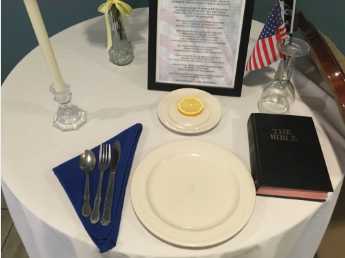Veterans Administration Updates Policy to Protect Inclusion of Religious Elements in Publicly Viewable Displays

WASHINGTON — The U.S. Department of Veterans Affairs (VA) recently updated its policies surrounding the use of religious elements in publicly viewable displays in VA facilities nationwide in order to ensure that religious freedom is protected.
“We want to make sure that all of our veterans and their families feel welcome at VA, no matter their religious beliefs. Protecting religious liberty is a key part of how we accomplish that goal,” VA Secretary Robert Wilkie said in a statement.
“These important changes will bring simplicity and clarity to our policies governing religious and spiritual symbols,” he explained, “helping ensure we are consistently complying with the First Amendment to the U.S.Constitution at thousands of facilities across the department.”
The policy outlines that religious imagery may be included in “passive displays” — defined as a wall, table, or monument — as long as the usage simply reflects the role of faith in the lives of the people and does not “elevate” one religion over another.
“Religious symbols may be included in a passive display, including a holiday display, in public areas of VA facilities , if the
display is of the type that follows in the longstanding tradition of monuments, symbols, and practices that simply recognize the important role that religion plays in the lives of many Americans,” it states.
“Such displays should respect and tolerate differing views and should not elevate one belief system over others,” the directives advise. “This policy does not govern displays in VA chapels during and in-between religious services. It also does not apply to displays in employees’ workspaces that are not generally accessible to the public.”
The policies mean that religious symbols or texts that are part of a display in VA lobbies or entrances, or on information desks, are permissible as long as they fall within the guidelines.
The VA says that the updated rules will also ensure that those who request literature while visiting chapels at VA medical centers will have unhindered access.
While not mentioned specifically in its press release, the directives would enshrine the right for Bibles to be included in POW/MIA “Missing Man” tables. As previously reported, the Bible was recently removed from a Missing Man table at the Manchester Veterans Medical Center in New Hampshire following a group complaint, but was later returned after a religious liberties organization sent a letter stating that the Bible’s inclusion was not unconstitutional.
First Liberty Institute, which submitted the letter, cheered the VA’s clarified policy, calling it a “breath of fresh air.”
“The Supreme Court recently upheld the constitutionality of religious displays with historic roots such as those commonly found in VA facilities,” said Director of Military Affairs Mike Berry in a statement. “We commend the VA for taking this necessary and positive action.”
However, groups like the Freedom From Religion Foundation (FFRF) opposed the move, remarking in a letter to Secretary Robert Wilkie, “Were the VA truly concerned about protecting the religious freedom of veterans, it could simply do what the Constitution prescribes and keep its facilities free from government-endorsed religion.”
In John 17:3, Jesus said in lifting his eyes to Heaven, “And this is life eternal, that they might know Thee, the only true God, and Jesus Christ, whom Thou hast sent.”
Become a Christian News Network Supporter…

 Dear Reader, has ChristianNews.net been of benefit and a blessing to you? For many years now, the Lord has seen fit to use this small news outlet as a strong influential resource in keeping Christians informed on current events from a Biblical worldview. With much compromise and many falsehoods in modern-day Christianity, we strive to bring you the news by keeping Christ and His word in focus. If you have benefited from our news coverage, would you please prayerfully consider becoming a Christian News supporter by clicking here to make a one-time or monthly donation to help keep the truth of God’s word widely and freely published and distributed? May Christ continue to be exalted through this work!
Dear Reader, has ChristianNews.net been of benefit and a blessing to you? For many years now, the Lord has seen fit to use this small news outlet as a strong influential resource in keeping Christians informed on current events from a Biblical worldview. With much compromise and many falsehoods in modern-day Christianity, we strive to bring you the news by keeping Christ and His word in focus. If you have benefited from our news coverage, would you please prayerfully consider becoming a Christian News supporter by clicking here to make a one-time or monthly donation to help keep the truth of God’s word widely and freely published and distributed? May Christ continue to be exalted through this work!





Comments are closed.